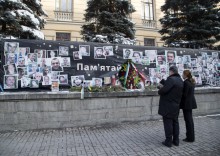January 20 marks 16 years since Ukraine signed the Rome Statute. But, at the request of then President Leonid Kuchma and by decision of the Constitutional Court, parliament did not ratify this document, for this required amending the Constitution’s clauses on justice. This slowdown of the ratification process coincided with the murder of Georgy Gongadze and the “Melnychenko tapes scandal.” In late 2015 President Petro Poroshenko formally proposed that ratification of the statute be postponed for another three years.
It will be recalled that the Rome Statute has jurisdiction over prosecuting and bringing to justice individuals who have committed very serious violations of international criminal law, international humanitarian law and human rights, such as genocide, crimes against humanity, war crimes, and crimes of aggression.
Out of the Council of Europe member states, Russia, Azerbaijan, Armenia, Moldova, and Turkey have not acceded to the statute. Meanwhile, ratification of the statute would allow Ukraine to join the list of the countries that fully adhere to international law. This is especially important during the Donbas war, where Russian bandits are committing mass-scale crimes against Ukrainian citizens. We have discussed this issue with Mykola HNATOVSKY, Associate Professor at the International Law Department of Kyiv Taras Shevchenko National University’s Institute of International Relations.
“I think our leadership has taken quite a serious attitude to the International Criminal Court (ICC). It submitted two applications to the ICC in 2014 and 2015, recognizing the latter’s jurisdiction first over the crimes committed during the Euromaidan and then over all the events that occurred as part of the armed conflict. What is more, Ukraine recognized the ICC’s jurisdiction without a deadline. The ICC has already launched a preliminary criminal investigation of the abovementioned events.
“But we are still dragging our feet, as far as final ratification of the Rome Statute is concerned. There are objective and subjected factors that cause this. The objective factor is that the Constitutional Court blocked ratification as far back as 2001, stating that the Rome Statute did not comply with the Constitution because the International Criminal Court did not complement our national system of justice. For the Rome Statute to be ratified, certain changes to the Constitution are to be made, which is difficult, albeit quite possible, to do. After all, the president-proposed reform of the Constitutional clauses on justice envisages the possibility of ratifying the Rome Statute.
“However, the transitory provisions of this bill say that ratification of the Rome Statute can be deferred for three years. I think it is an erroneous decision. It is difficult for me to find any convincing proof in support of this decision because if Ukraine were really afraid that the ICC might bring to justice some of the defenders of Ukraine, it would just not have accepted the ICC’s jurisdiction. In other words, the idea of a three-year deferral is based on some other considerations. I suspect they are of a political, not a juridical, nature. Maybe, it is the fear of a negative public effect from a full ratification of the Rome Statute, but these fears are absolutely wrong and groundless. Ukraine will lose nothing if it ratifies the Rome Statute in the current situation – on the contrary, it will only get a benefit by becoming a full-fledged participant in the process and joining the states that are a party to the Rome Statute and the ICC. This will impose no additional commitments on Ukraine.
“According to many Constitutional Court judges, the problem was purely technical in the early 2000s. But word has it that somebody made Kuchma gain a wrong impression about the ICC’s powers, hinting that this court might as well have something against the president himself, which is totally absurd. This cannot happen because the ICC deals with the gravest crimes of a literally historical scale, i.e., crimes against humanity and war crimes. I am afraid somebody could also cause the current president to get a wrong idea of the ICC’s powers.
“As for the killings of Ukrainians in the Donbas, the ICC can help, but we must remain realists and take a sober view of the ICC’s capacity. The ICC is only effective if it complements national efforts, i.e., prosecution of criminals on the national level. The state on whose territory crimes were committed is primarily responsible for the prosecution and punishment of criminals. The ICC can only help if Ukraine is physically unable to reach the criminals. In that case, the ICC can mount an international campaign to bring them to justice.”








